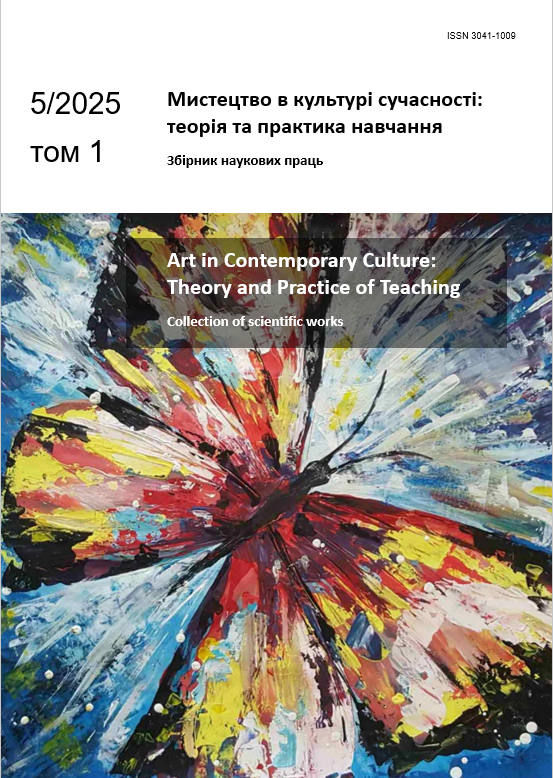THEATRE AS A PEDAGOGICAL FORM OF REALIZING THE TASKS OF HOLISTIC EDUCATION OF THE PERSONALITY IN THE EARLY MODERN TIMES
Published 2025-05-15
Keywords
- holistic education, humanism, theatre, school theatre, theatrical art, Renaissance humanism, Protestant gymnasium, Catholic college, Erasmus of Rotterdam

This work is licensed under a Creative Commons Attribution 4.0 International License.
How to Cite
Abstract
The article is devoted to the historical-pedagogical and historical-cultural analysis of the views of European humanists and the study of early modern educational practices for the integration of theater and theatrical performances in solving the problems of comprehensive education of the individual. The Renaissance-humanistic vision of the pedagogical potential of the theater is revealed, and the features of this form of education in the practice of early modern European educational institutions - Protestant gymnasiums and Catholic colleges are traced.
It is found that in the early modern cultural and ideological systems (Renaissance humanism, Protestant humanism, Catholic humanism) there was a common recognition of the significant role of theater and theatrical art in the implementation of the obstacles to the holistic education of the individual. It is established that determining education by the humanistic priority of “sapientem et eloquentem pietatem” (“learned and eloquent piety”), the thinkers of that time proclaimed education, eloquence and virtue as the key criteria of holistic education. The integration of theater into the educational process made it possible to successfully form these criteria: the study of plots and texts of Latin authors formed humanistic education; Speeches and role-playing allowed to effectively develop eloquence, and the content of the performances was aimed at developing virtue and spiritual and moral formation. It is proven that humanists unanimously emphasize the exceptional pedagogical value of school theater, and educational reformers (Protestants and Jesuits) successfully scale up humanistic ideas of intellectual, aesthetic and spiritual and moral education in a wide cultural and educational network of gymnasiums and colleges.
The significance and role of theatrical art in the implementation of the humanistic philosophy of holistic education of the individual are determined. It is noted that early modern pedagogical ideas about theater had a broader effect than just educational. The theaters of that time marked the beginning of a new era in the development of theatrical art. Unlike the medieval theater, the humanistic approach made it possible to significantly “democratize” the choice of topics, add creative fantasy to the plots of performances, which ensured the widespread flourishing of school drama in the European socio-cultural space of the early modern period.
Downloads
References
- Год Б. В. Дитячі ігри (від Античності до початку ранньомодерного часу) : монографія. Полтава : Вид-во ПНПУ ім. В. Г. Короленка, 2015. 182 с.
- Конституції Товариства Ісуса та їх Додаткові Норми / пер. з англ. А. Маслюх. Львів : Свічадо, 2005. ХХV, 532 с.
- Навольська Г. Роль шкільного театру у формуванні духовності в навчальних закладах ордену єзуїтів. Українська освіта у світовому часопросторі : матеріали Міжнар. конгресу, Київ, 25-27 жовтня 2007 р. Київ: Рада, 2007. С. 366–368.
- Пилипчук Р. Я. Театр : текст і дійство. Історія української культури : у 5 т. / голов. ред. Б. Є. Патон. Київ : Наукова думка, 2001-2013. Т. 2 : Українська культура ХІІІ – першої половини ХVІІ століть / ред. Я. Д. Ісаєвич. 2001. С. 721–729.
- Прибора Т. Шкільний театр як форма єзуїтської системи виховання (XVII-XVIII ст.). Психолого-педагогічні проблеми сільської школи. 2017. Вип. 57. С. 281–288.
- Сєряков С. О. Повсякденне життя єзуїтських шкіл України. Повсякдення ранньомодерної України. Історичні студії : в 2 т. / голов. ред. В. Смолій ; відп. ред. В. Горобець. К. : Ін-т іст. України, 2012. Т. 1 : Практики, казуси та девіації повсякдення. 2012. С. 99–140.
- Цебрій І. В. Науково-практичні підходи до змісту театральної освіти в діяльності церковно-монастирських шкіл. Педагогічні науки : зб. наук. пр. / Полт. нац. пед. ун-т ім. В. Г. Короленка. Полтава : ПНПУ ім. В. Г. Короленка, 2006. Вип. 6 (53). С. 127–135.
- Шевченко Т. М. Docere, Movere, Delectare : виховні практики єзуїтських шкіл ранньомодерного часу. Труди Київської Духовної Академії. Київ : Вид. від. УПЦ, 2013. № 19. С. 241–270.
- Яковенко Н. М. Латинське шкільництво і «шкільний гуманізм» в Україні кінця XVІ – середини XVІІ ст. Київська старовина. 1997. № 1-2 (315). С. 11–27.
- Cartwright K. Theatre and Humanism. English Drama in the Sixteenth Century. United Kingdom: CAMBRIDGE UNIVERSITY PRESS, 1999. 350 p.
- Kochanowicz J. Wklad Jezuitow w Kulturę Muzyczną Okresu Staropolskiego. Wklad Jezuitоw do Nauki i Kultury w Rzeczypospolitej Obojga Narodоw i Pod Zaborami / pod red. naukowa I. Stasiewicz-Jasiukowej. Krakоw ; Warszawa : WAM, 2004. S. 545–562.
- Shakespeare W. All the world’s a stage. URL: https://www.poetryfoundation.org/-poems/56966/speech-all-the-worlds-a-stage
- Vives J. L. Tratado de la Ensenanza. Introduccion a la Sabiduria. Escolta del Alma. Dialogos. Pedagogia Pueril / est. prelim. y prologos J. M. Villalpando. Mexico : Editorial Porrua, 2004. N. 447. 448 р.





